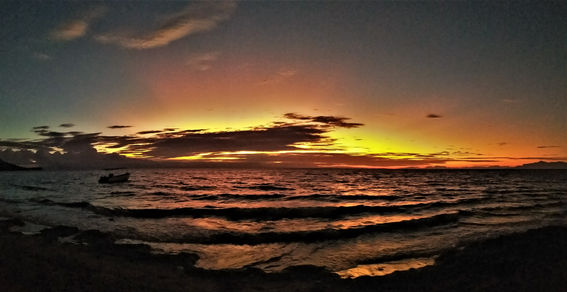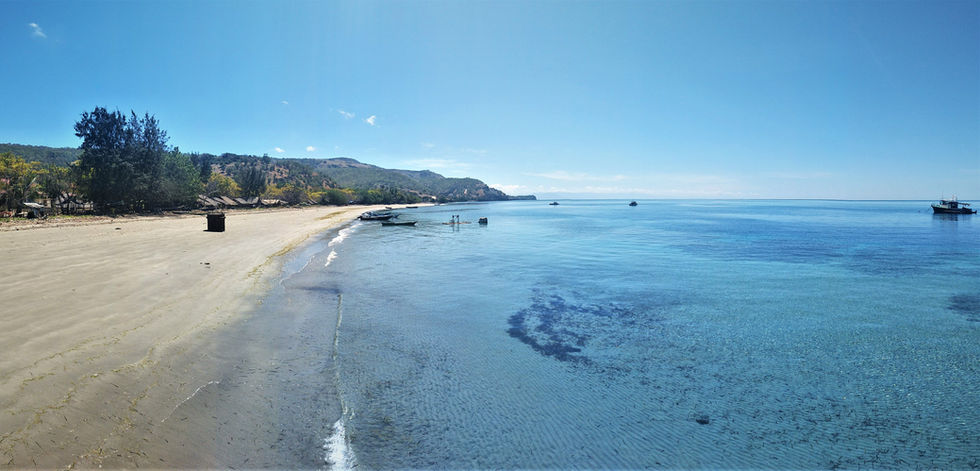
Atauro Island
Timor-Leste
The loudest chorus of roosters I have ever heard in my life woke me up nice and early in the morning. After having plenty of time to get ready, I made my way down to the pier, where I jumped on the ferry bound for Atauro Island. There weren't many tourists on board.
I was treated to blue skies the entire way, and I prayed that would last the day. Atauro slowly came into view, with its green jagged mountains making me excited for the hiking opportunities ahead. Low clouds obscured the tops of peaks, which rose almost 1000 m above sea level.
The pier on Atauro Island was in the middle of the main town, Beloi, but there was very little town to be seen. There were a few wooden shacks, a couple of gloomy stores selling mostly clothes, then it was countryside. A small Saturday market had been set up in amongst the shacks, which seemed to sell only coconuts and dried fish. It didn’t hold my interest for long.
A five-minute walk down the main road, where I passed nothing but a couple of houses, a row of empty beach shacks and small cemetery, led me to my accommodation (the cheapest of the three places I found online). It was located right on the sea and surrounded by beautiful gardens, with hammocks to lie in and the luxury of shared showers of the bucket variety. It was almost perfect.
Thankfully, all my meals could be prepared here, as there were no restaurants in town other than at the two other resorts. And to make it even better, they could happily accommodate vegans. One staff member was also vegan, so feeding me was no difficulty. At lunchtime a huge plate was placed before me, consisting of tempeh sauteed with vegetables, rice and salad. My stomach was at bursting point by the end. I wasn't going to starve here.
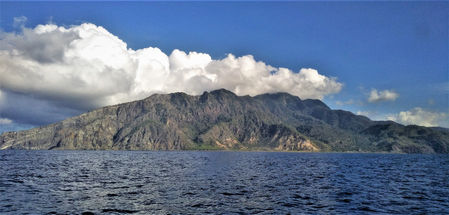
After digesting lunch in a hammock, I set out for an afternoon hike up north. To make it easy on myself, I just followed the wide gravel road that hugged the coastline. There was barely any traffic and the piercing sun had drifted behind light clouds, making for a pleasant stroll. At a couple of points the road led me high above the water, giving me fantastic views along the east coast of the island. However, none of the beaches looked particularly inviting, full of dark grey sand, rocks and loads of plant matter.
Eventually, I hit the town of Bikeli, which actually felt bigger than Beloi. One- and two-roomed huts lined the street, and the residents slowly performed their daily chores. Out the other side was the Bikeli viewpoint, giving long-ranging views across the crystal clear water. The famed reefs of the region could clearly be seen below the surface.
It is unbelievable how friendly the locals are. Everybody, young and old, says hello as I pass. On more than one occasion, someone 100 metres behind me shouted out so I would stop, only so they could say hello, shake my hand and introduce themselves. Even if they don't speak a word of English, they do what they can to make you feel welcome.
I was told the best view of the island within Beloi is at Ponky's Bar, part of the Beloi Beach Hotel (which, ironically, is nowhere near the beach). Once I had climbed up a steep set of stairs, I found a beautiful open-air space with a fully stocked bar and a variety of seating choices. I ordered my drink, took it out to the balcony and stared out at thin strip of blue water I could see above the palm trees in the foreground. It definitely wasn't the best view I had all day, but it was the only one with alcohol. The grey clouds continuously changed their pattern as the sky gradually became darker. It was a shame we were facing east rather than west.
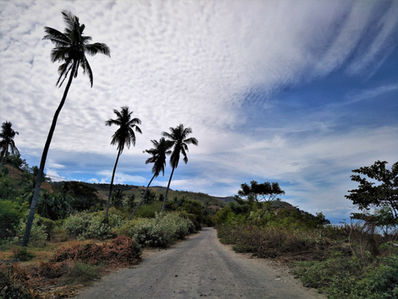
My alarm woke me early the next morning so I could watch the supposedly amazing sunrise over the water. There was a bit of colour in the sky, but I wouldn't put it in my top 10.
Once the sun had risen above the horizon, I set out for a hike across to Adara, a village on the west side of the island. The original plan was to summit to the tallest peak, Mt Manucoco, which topped out at 995 m. Because the mountain is considered sacred on the island, a guide is mandatory (it is also very easy to get lost and there are no maps). When I found out the price of the guide, plus a tuk-tuk to and from the start of the trail, I decided to give it a miss. I didn't mind too much, as there were plenty of other hikes I could do for free.
Side note: access to money is quite difficult in Timor-Leste, so I have to be selective as to where I spend it. MasterCard is not accepted by ATMs anywhere in the country (a fact I fortunately learnt two days before arriving), and only the high end hotels accept credit cards. As I have three MasterCards, no Visas, and I'm staying in budget accommodation, I have to ration my cash. Also adding to my decision not to hike Mt Manucoco was discovering the cost of getting a speedboat back to Dili. Cheap ferries sail on Saturday and Thursday (it was random luck that I arrived on a Saturday). On other days, you need to book a private boat, which comes in at about A$100 one way. I have flown internationally for less.
For the first few kilometres of my hike, I climbed steeply up an unstable gravel road, which saw me slipping and sliding continuously. Views over the water behind me slowly came into view the higher I ascended. I could also see Mt Manucoco out to my left, and I knew the views would have been great on a clear morning like today.
The top of the mountain I was climbing never seemed to arrive. Gradually, the environment changed from completely exposed grassy hills to a lightly forested area full of eucalypt trees. Combined with the dusty track and gentle heat, it was very reminiscent of Australia. It ended up being one of my favourite parts of the trek.
Near the crest I found myself surrounded by long, yellow grass that swayed in the breeze. A narrow path wound its way through the field, providing views out to the sea in the distance. It was beautiful. I would have been happy to hike through this for hours.

Not long later I hit a forest section, where I was greeted by swarms of horse flies (or March flies, as we call them in Australia). The insect repellent I was wearing obviously didn't mean much to them, as they stuck to my legs and refused to budge unless physical swatted away. I have no idea what the scenery was like because I was too busy staring down, trying to fend myself against the attack.
The flies disappeared by the time I reached the village of Arlo, where I could hear children singing in the local church. I guess the whole town was there, because I didn't see a single person around.
Following a hand drawn map, I turned down a path that would take me out to the sea. The path eventually became so overgrown I couldn't see my feet, but I pushed forward as I saw glimpses of the water ahead of me. The final obstacle was descending an almost vertical rock face, with all four limbs required to lower myself down. From the bottom it was a quick walk through tall grass out to the coast.
Immediately I noticed how much nicer this beach was than the one in Beloi. Clear blue water, white sand, an absence of human intervention - it was fantastic. The only issue was that my final destination was another 3 km walk along the sand and it was high tide, meaning I had to walk on the loose rocks at the top of the shore. It was slow going for a long time, until I realised there was a path running parallel to the beach on solid ground. I wish I had found this earlier.
The path took me all the way to Adara, where I could hear another church service in progress. I ended up at Mario's Place, which everyone told me was the best accommodation on the island. The waterfront bungalows definitely had a lot going for them, but like the rest of Adara there was no one around. I also hadn't passed anyone on the trek since I left Beloi, making my experience feel more remote than it probably was. Luckily I didn't need to buy more water, otherwise I would have been in trouble. I sat on an empty balcony at Mario’s, eating the breakfast my resort had packed for me. The scenery was superb, staring out across the sea and not hearing anything but the waves lapping at the shore.

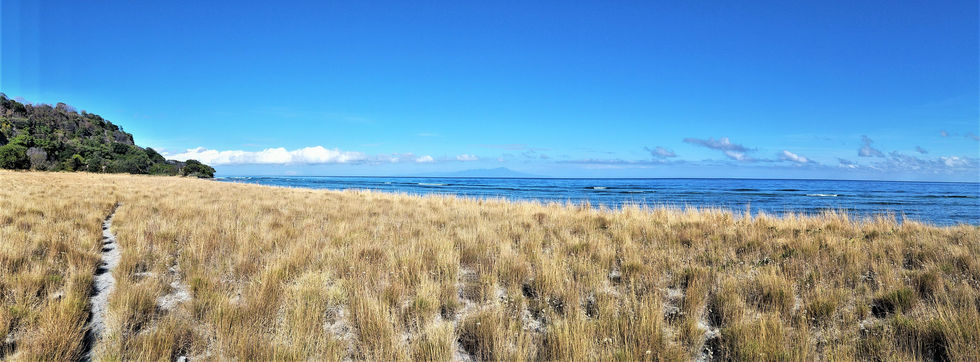
During the hike to Adara I had been mostly sheltered from the sun, but now that it was nearing midday I had to contend with the sun’s harsh rays as I trekked back along the sand. Thankfully I had my GPS watch to tell me when to turn off the beach and back into the wilderness, as the path was not at all clear. I climbed up the precipitous rock face, using my hands to steady myself, before making it back to Arlo. Goats, chickens, cows and a solitary pig all guided my way, although most of them ran as I approached.
As I neared the forest, I knew I was in for another horse fly attack. Right on cue, they honed in on me, sticking to my legs and putting up a fight to give up my skin. I ran briefly though this area but it didn't seem to matter. For the next 5 km they followed me, taking every opportunity to latch onto my legs for a tasty meal. I spent this whole time bent forwards, swiping at my legs. It wasn't fun.
On the road leading down to Beloi, I left behind the eucalypt trees (and the flies) and entered a field of palm trees. It was like suddenly being transported from southern to northern Australia. A short walk through town and I was back at the resort by midday (I was told the trek would take most of the day - everyone was a little surprised to see me so early), just in time for lunch. I was given an enormous plate of noodles, plus a tempeh stew to go with it. I'm fairly sure there were five packets-worth of 2-minute noodles in front of me. I ate the whole lot.

Timor-Leste sits right inside the coral triangle, a place renowned for superb diving and abundant sea life. It had been seven years since I had been diving, and as this was one of the most expensive places in the world to dive, I wasn't upset to give it a miss. Instead, I hired snorkelling gear and walked straight out to the water from my resort.
The clarity of the water was instantly apparent. Even as I swam further and further from shore, I could still see details of the seafloor below me. Sea stars seemed to dominate the shallower waters, but further out I was surrounded by schools of fish of all colours and sizes. I was told there were often turtles swimming in these parts, which of course got my hopes up. As hard as I tried, I didn’t spot any. It didn't dampen the fantastic experience.
Later in the day, I again walked to Ponky's bar and relaxed with a drink while overlooking the faraway sea. Apart from the cacophony of roosters and the hum of generators, it was a peaceful setting. Tonight I was rewarded with blue skies, with unimpeded views all the way out to the mountains on the mainland.
As I was brushing my teeth, I noticed a humongous hairy spider sitting on the curtain in my room. I knew I couldn't remove it myself, but there was no way I was sleeping in the same room as it. I walked out to the common area of the resort and shouted out for help. It was after 9 p.m., which meant everyone was in bed already. Between the groan of the generator and the wind off the shore, my voice was drowned out immediately. I tentatively walked over to the manager’s bungalow and found one of the owners, an elderly man, sitting on the balcony. I told him my predicament and he got up straight away to help. Armed with insect spray and a broom, he managed to coerce the spider out the door and into the garden. I was forever grateful, but I wasn't entirely confidant that it wouldn't come back or that it didn't have friends in the area. In the end I had an uneventful sleep, listening to the waves/generator in the background.

































